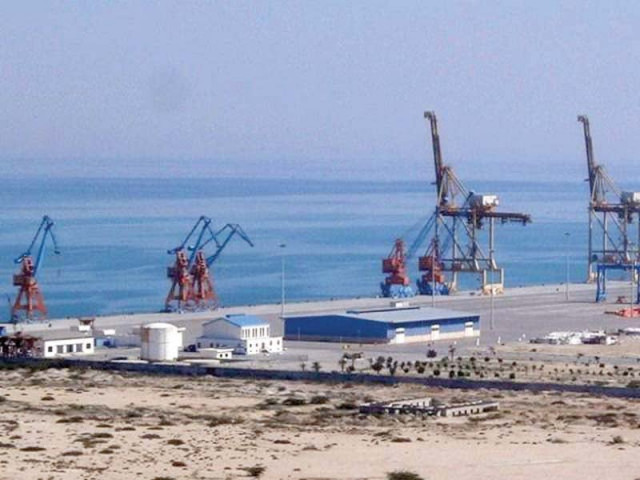Pakistan's prospects of 5% growth rate at risk, says World Bank report
Delay in completion of CPEC projects will be an impediment

Pakistan’s economic growth is expected to increase gradually, and the economy is projected to grow by 5.4% in next fiscal year 2017-2018. PHOTO: FILE
“A delay in the completion of CPEC projects, as evident from the first year’s performance, and an inability of the government to mobilise revenues and rationalise expenditures can affect investment and hurt economic growth,” noted the World Bank in its biannual ‘South Asia Economic Focus Fall 2016’ report.
UK assures Pakistan GSP Plus-like trade package
The report also highlighted the issue of growing tension in relation to Kashmir between India and Pakistan; two nuclear powers that have fought four wars and which it added “is watched with concern”.
Political economy risks are widespread across South Asia and uncertainty, more broadly, needs to be managed with a view to creating an attractive environment for foreign and domestic investment alike, it added.
The Washington-based lending agency said that gradual growth trend is underpinned by increased public investment supported by CPEC. It has projected that Pakistan’s economy may grow at a rate of 5% during the current fiscal year 2016-17 - 0.7% below the official target.
Pakistan needs more than 7% annual economic growth rate to create sufficient jobs for new entrants.
Public investment can expect a boost from projects related to the CPEC agreement, but remains subject to uncertainty stemming from potential implementation delays, it added.
The report is a reminder to the October 2015 study conducted by the Institute of Policy Reforms (IPR) that highlighted that the medium-term economic framework prepared by the International Monetary Fund (IMF) made no provision for a big rise in government investment in the next two years to create room for timely completion of the $11-billion infrastructure projects under CPEC.
The IPR study did not work out the impact of administrative weaknesses that are equally hurting the implementation of CPEC projects.
“China has also started raising concerns over delay in the implementation of CPEC projects, notably energy sector transmission and generation projects,” said officials involved in execution of these projects.
“Except for two coal-based and one wind-farm projects, most of the priority energy projects of the CPEC are facing delays,” according to background discussions with the Ministry of Planning, Development and Reform officials and others working on these schemes.
“Chief ministers showed their confidence on the progress of CPEC projects in the CPEC summit held on August 29 but some elements and anti-CPEC forces are spreading misgivings and misguiding people of Khyber-Pakhtunkhwa (K-P),” said Minister of Planning, Development and Reform Ahsan Iqbal on Tuesday, while chairing a meeting of the Cabinet Committee on Infrastructure.
The World Bank report said industrial production indicators remained volatile except in case of Pakistan where the outlook had been slightly more positive on the back of large-scale manufacturing and construction activities, driven by infrastructure and energy projects falling under the CPEC agreement.
“However, recent delays may water down expectations,” it added.
In Pakistan, private investment has traditionally grown more slowly than public investment, however, the sluggishness of private fixed capital investment is reaching new levels.
IMF confident Pakistan can now handle mild economic shocks
Pakistan’s economic growth is expected to increase gradually, and the economy is projected to grow by 5.4% in next fiscal year 2017-2018.
The report added that this growth rate will primarily be driven by infrastructure projects under the CPEC and public investment.
These projects are expected to accelerate growth in the domestic construction industry and increase electricity generation. Improved electricity availability will support growth in the industry and services sectors, but expected slowdown in the implementation would water down these expectations, it said.
Moreover, it said Pakistan’s current account deficit was expected to widen during next two financial years; the key contributor to this will be a widening trade deficit due to moderate growth in exports and rapid growth in CPEC-related imports. However, continuous growth in remittances and financial flows will help in financing the current account deficit.
The report also projects Pakistan’s fiscal deficit to remain at 4.2% at the end of the fiscal year - 0.4% higher than the Ministry of Finance target.
“The improvement in fiscal accounts hinges upon the government’s will to persist with fiscal consolidation through revenue mobilisation efforts and expenditure rationalisation,” it cautioned.
Published in The Express Tribune, October 5th, 2016.
Like Business on Facebook, follow @TribuneBiz on Twitter to stay informed and join in the conversation.



















COMMENTS
Comments are moderated and generally will be posted if they are on-topic and not abusive.
For more information, please see our Comments FAQ